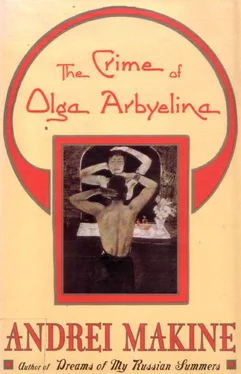All the while she was examining the photos, the voice of the "little bitch" persisted in pointing out strange inconsistencies. "Why are the first two completely blank and the third one hardly lit while the last two came out?"
"Shut up. It's probably a defect in the camera."
"And why is the door open?"
"A draft."
"And the cat?"
"Shut up. I don't want to know anything about it."
This altercation did nothing to reduce her amazement at the woman in the photos. It was only late in the evening (she heard a slight sound from the direction of the boy's room and got up rapidly, ready to come at the slightest call) that the reproaches of the little bitch again reverberated in her mind: "All these photographs are very nice but you'd do better to think about your son once in a while…"
Olga did not reply. She went to the door, opened it, listened to the silence along the corridor. Their strange house consisted of this corridor with her room, the kitchen, and the bathroom at one end, and the boy's room at the other. A storeroom furnished with a tiny window was located halfway along it and served as a library. The boy called it "the book room…"
Hearing nothing, she went back to bed. What could she reply to the voice hounding her with its reproaches? Tell it that on the top shelf in the "book room," inaccessible to the boy, there were a good dozen volumes devoted to his illness. And that she knew every paragraph of them by heart, all the treatments described, the tiniest details of every stage in the progress of the illness. Reply that on occasion she had nightmares in which the course of the illness was speeded up and completed in a single day. But that to think about it all the time would not have been living; it would be losing one's reason and therefore not allowing the child to live. He needed a quite stupidly normal mother, that is to say unique, constant in her affection and her calm, constant in her youthfulness…
The little bitch was silent. Olga got up again (she was already regretting not having brewed up her infusion), went to the mirror, gathered up her hair in a thick tress, and began to cut it shorter with a large pair of scissors… She told herself that the photographs, the tales told by readers at the library, the endless arguments with the little bitch, the anxious arithmetic of women's ages, all this torrent that filled her days, was in fact the only way to avoid spending all her time thinking about the books perched on the top shelf in the book room out of bounds to the boy. To immerse herself in this torrent was her way of letting him see her as a mother like all the others. Of seeming to herself to be a woman like the others, in order better to play the part of that mother.
Before falling asleep she repeated several times in a silent whisper, trying to sound as natural as possible, "You know, perhaps we could go to Paris tomorrow or the day after, I'd like to show you… No! Look, we're going to Paris: I've been told about a doctor who… No. Someone who's a really nice man, a leading specialist in your… No. In your problems…" Generally her mind functioned without her being aware of it. Now she became conscious of this almost automatic mental process. "So I'm thinking about him all the time," she said to herself, as if she had won a bitterly disputed victory over the voice that persecuted her.
Next day at the library she was eager to be over and done with
the usual preparations for the start of the day. She could not resist the ludicrous impulse to spread out the three snapshots in secret behind her display shelf and examine them once more before the arrival of the first readers. Actually to examine them here in a neutral setting that ought to allow the photographs to be seen in an impartial light. An element in her desire to do this was that obsessive fascination of particular photos that one longs to keep looking at with the dependency of a morphine addict either to confirm that their mysterious charm has not vanished or, by contrast, in the hope of discovering some new detail in them that will transform their snapshot world.
She opened two parcels of new publications, but in her impatience decided to enter them later and began to clip the French and Russian newspapers into their rods. She generally took the trouble to leaf through them, though she was sure of learning their contents from the readers' interminable commentaries. This time she merely looked at the headlines on the first few pages, theft of duchess of Windsor's jewels… Josephine baker, officer in the resistance… algerian unrest: fever attack or growing pains… trains to run faster october 7: new drive by sncf, paris-bordeaux in 6 hours 10 minutes; paris-marseilles in 10 hours 28 minutes.
At last she was able to examine the three snapshots in peace. The beauty and youthfulness of the woman in the photographs fascinated her yet again. While listening alertly for footsteps outside the door, she studied this body, striving to be pitiless. But the unknown woman casting off her nightgown and in the next photograph standing in front of the window had nothing about her that betrayed a sagging, a decline. The back revealed beneath the nightgown was of an almost juvenile suppleness. And although this instant in her life was captured at random, the camera had recorded what in her own eyes distinguished her body from those of other women she had observed: ankles with very slender Achilles tendons, as if pinched between the thumb and forefinger of a giant sculptor; and also the delicacy of the collarbones, that looked as if they were too slender to support the opulence of her full, heavy breasts. One never knows, often until one's dying day, whether other people notice such features and appreciate them or judge them to be graceless.
Yet more intensely than the day before, this woman surprised in front of the dark window gave the impression of trembling on the brink of an amazing revelation. "She is totally… how can I put it? Unrecognizable? Other? The fact is, at that moment I was-other…" She tilted the snapshot to change the angle of lighting, hoping that the words she sought might suddenly emerge from its surface and capture its mystery in a formula… The first readers of the day were already arriving at the door.
To begin with, a very elderly boarder from the retirement home came into the room. Generally books were brought to her by the nurse. But that morning she had had the strength to come in person, quite amazed, quite radiant, to have managed to endure the long trek from one floor to the next, and quite dazzled, too, by the brilliance of the autumn sun that was shining through the windows. One could picture the feats this little body, almost transparent in its dressing gown, must have had to perform in order to climb stairs and walk down long corridors, filled with howling drafts that smelled of cooking, the street, and river damp. She had a long struggle with the door: as it closed it almost dragged her with it, almost wrenched her arm off by the force of its spring. In the look she leveled at Olga, along with her amazement, there was a reflection, at once anxious and proud, of all the dangers overcome… As Olga escorted her back to her room she was addressing her, often breathlessly. "In the springtime… in spring I really must show you those flowers. You see they grow almost at the foot of the trees, coming up through the dead leaves. I'm sure even the French don't know them. In the spring. We'll go together. You'll see. They're pale white. And quite beautiful!"
Going to look for these white flowers in the woods in springtime was a promise Olga had been hearing for several years now…
The round of the readers resumed. The cavalry officer told the story of his best horse, the one that was trained to lie down and stand up in obedience to a prearranged whistle. Then he acted out another saber fight and did his "S-s-shlim!" impression.
Читать дальше












